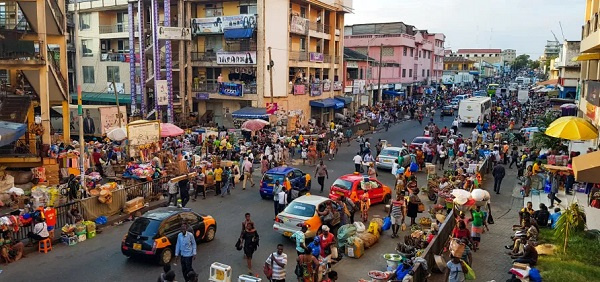For every five Ghanaians, two of them are identified as multidimensionally poor – meaning more than 45 percent of the country’s population are affected by multiple types of poverty, a Ghana Statistical Service (GSS) report has revealed.
Multidimensional poverty considers the many overlapping deprivations that poor people experience. The Multidimensional Poverty report, which gathered information from 14,009 households and 59,864 individuals, shows the multidimensional poverty headcount ratio is between 43.7 percent and 47.5 percent of the population.
Again, the intensity of poverty, which reflects the share of deprivations each poor person experiences on average, is 51.7 percent. This means the poor are disadvantaged in six or more of the following twelve indicators: electricity, water, housing, assets, overcrowding, cooking fuel, sanitation, school attendance, school attainment, school lag, nutrition, and health insurance.
A break-down of the report shows 86.8 percent of poor Ghanaians, irrespective of their poverty status, are deprived of sanitation; i.e., households which have no toilet facilities, use buckets or pans, public toilets, or share toilets outside the house. The next thing that poor Ghanaians are deprived of is health insurance, as the data says 64.6 percent of them are not covered by health insurance; rather surprisingly, as politicians always boast about the National Health Insurance Scheme covering a large number of the population.
Housing is next on the list, as the study shows 36.6 percent of the poor population use inadequate flooring or walls made with one or multiple of the following materials: earth, mud, palm-leaves, thatch made with grass or raffia.
Furthermore, the data shows 35.4 of poor households have, on average, more than three people per sleeping room. And again, 22.4 percent of the poor population drinks water from an unclean source – i.e., from tanker supply or vendor-provided; unprotected well; unprotected spring; river or stream; dugout, pond, lake, dam, canal or some other source; or a round-trip distance to collect water which takes 30 minutes or more.
The percentage of the population that is vulnerable to multidimensional poverty is 31 percent – and 21.4 percent of the population are considered to be in severe poverty. On geographical considerations, the report shows the levels of deprivation for all the indicators are higher in the savannah compared to the remaining two ecological zones.
Another important revelation in the report is the age groupings of multidimensionally poor people. The data surprisingly reveals multidimensional poverty is prevalent among children under 15 years – contrary to the previous belief that the risk of poverty is prevalent among the elderly. The results suggest that households without a child are likely to be less poor.
In prescribing solutions based on the data collected, the report advised policymakers to prioritise the use of resources in order to reduce the high deprivations in the indicators of wellbeing.
“Against the backdrop that the percentage of multidimensional poor individuals deprived in each of these indicators varies across ecological zones and administrative regions, it is important to prioritise and sequence policy actions as functions of the percentage of individuals and households facing each deprivation.
“Regarding child indicators, it is pertinent to mention that the government should continue working with the existing institutions on reducing deprivations in school attendance, school lag and child undernutrition.”





